 |
 |
 |
| |
Associations of loneliness with cognitive function and quality of life
(QoL) among older adults living with HIV
|
| |
| |
"In comparison to "never" feeling lonely, feeling lonely "sometimes" or "quite often" was consistently associated (p<0.001) with poorer emotional and physical health outcomes including those reflecting cognitive ability, stress, depression, and anxiety, and those reflecting self-rated health, health-related QoL, and overall QoL."....In table below "Consequences of Loneliness to self-rated health and QOL", health and QOL were rated lower for those "quite often lonely" - take look at tables for graphic descriptions. Remember the ages of participants were over 35 in this study so its not a stretch to think that outcomes & loneliness might be much worse for older aging HIV+ and older aging with many comorbidities and reduced mental & physical functioning; although mean age is 52 in study looking more specifically at those over 65 would be interesting. Looking at graph below "Loneliness and SF-36" depicts the affects of loneliness on general health perception, social functioning, role limitations due to physical health, tole limitations due to emotional health, mental health inventory (emotional well-being), vitality (energy/fatigue), pain. ISNT IT TIME TO PAY ATTENTION TO THIS by providing support services for aging older HIV+ over 65 who are severely impacted by these and are homebound, depressed, socially isolated and lonely, and unable to perform daily normal functioning activities including shopping, home care and self-care and navigating the health care system. An intense personal form of care coordination is needed. Many older HIV+ are dealing with cancers, heart disease, kidney disease etc and need a system of support services, many are dealing with 5 or more serious comorbidities at once and supposed to be seeing 5-10 different specialist doctors, very hard to navigate, and sometimes hard to understand the import & status of their own health. At the same tome stigma and self-stigma worsens as HIV+ begin suffering the impact of all this and with aging self-stigma and external stigma worsens. Loneliness impacts on motivation, self-stigma, QOL through activity, poor lifestyle choices, and downstream effects on self-reported health, HRQOL, and subsequently QOL.
Reported by Jules Levin
9th Aging and HIV Workshop
NYC Sept 13-14 2018
Harris M1,2,3, Brouillette M3,4, Mayo N4, Smaill F3,5, Smith G6, Thomas R7, Fellows L3,8
1British Columbia Centre For Excellence In HIV/AIDS, Vancouver, Canada, 2Department of Family Practice, University of British Columbia, Vancouver, Canada, 3CIHR Canadian HIV Trials Network, Vancouver, Canada, 4Research Institute, McGill University Health Centre, Montreal, Canada, 5McMaster University, Hamilton, Canada, 6Maple Leaf Medical Clinic, Toronto, Canada, 7Clinique medicale l'Actuel, Montreal, Canada, 8Department of Neurology & Neurosurgery, McGill University, Montreal Neurological Institute, Montreal, Canada
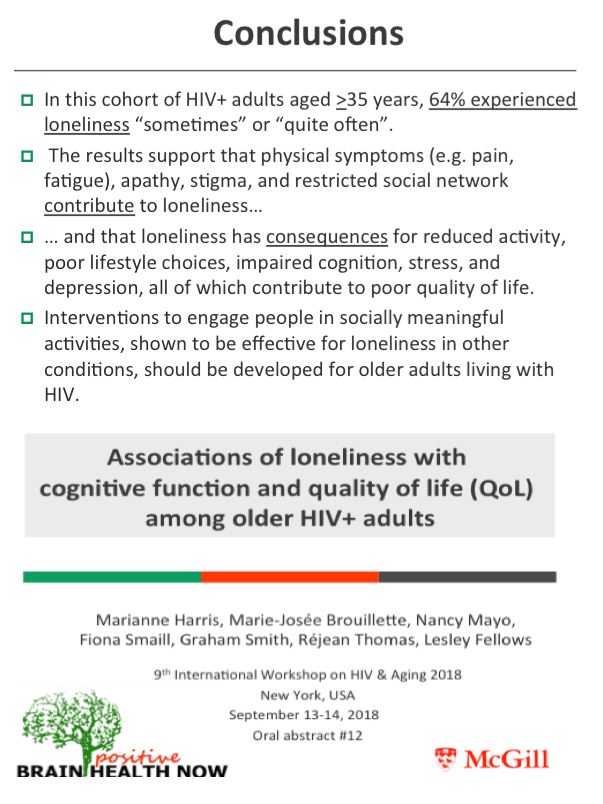
-------------------------------------------
Program abstract
Background: Loneliness, a perceived state of undesirable social isolation, is associated with adverse emotional and physical health outcomes. People living with HIV often face unique challenges that heighten their risk for loneliness and its consequences, including stigma, depression, substance use, lack of social connections, and physical symptoms related to HIV or comorbid conditions. Using a theoretical model supported from the literature, the purpose of this study is to estimate, among older adults living with HIV, the strength of the associations between loneliness and (i) factors hypothesized to contribute to loneliness and (ii) factors hypothesized to be consequences of loneliness.
Materials & Methods: Positive Brain Health Now is a prospective longitudinal cohort study conducted at five HIV outpatient clinics in Canada, enrolling participants aged ≥35 years diagnosed with HIV for ≥1 year. For this analysis, data collected from personal interviews, direct measurements, and self-report questionnaires at the first study visit were analyzed cross-sectionally. Loneliness was assessed by one item from the OARS Social Resource Scale: "Do you find yourself feeling lonely: quite often, sometimes or almost never?" Cognitive function was assessed using a computerized battery of cognitive tests (B-CAM) and the perceived deficit questionnaire (PDQ). Proportional odds regression and multiple linear regression were used to estimate the strength of the association between loneliness and brain and other health outcomes, adjusting for age, sex and education.
Results: Of 856 participants enrolled between 9/10/2013 and 8/6/2016, 836 responded to the loneliness question and were included in this analysis (85% men; mean age 52.0 years, SD 8.3). Almost 18% (n=148) said they "quite often" felt lonely and 46% (n=383) said they were "sometimes" lonely; these proportions did not differ between men and women. Factors associated with increased likelihood of loneliness (p<0.001) were lower economic status, more HIV-specific symptoms, experiencing HIV-related stigma, restricted social network, lack of motivation (no plans or goals), pain, fatigue, poorer physical function, and less physical activity. Participants 35-45 years of age, those not working or volunteering, and those who watched more hours of television per week were more likely to report feeling lonely (p<0.05). There was no association with smoking, alcohol consumption, marijuana use or use of most other drugs, except opioids which were associated with loneliness independently of pain (p<0.05). In comparison to "never" feeling lonely, feeling lonely "sometimes" or "quite often" was consistently associated (p<0.001) with poorer emotional and physical health outcomes including those reflecting cognitive ability, stress, depression, and anxiety, and those reflecting self-rated health, health-related QoL, and overall QoL.
Conclusions: In this cohort of HIV+ adults aged ≥35 years, 64% experienced loneliness "sometimes" or "quite often". The results support that physical symptoms (e.g. pain, fatigue), apathy, stigma, and restricted social network contribute to loneliness; and that loneliness has consequences for reduced activity, poor lifestyle choices, impaired cognition, stress, and depression, all of which contribute to poor quality of life. Interventions to engage people in socially in meaningful activities, shown to be effective for loneliness in other conditions, should be developed for older adults living with HIV.
-------------------------------
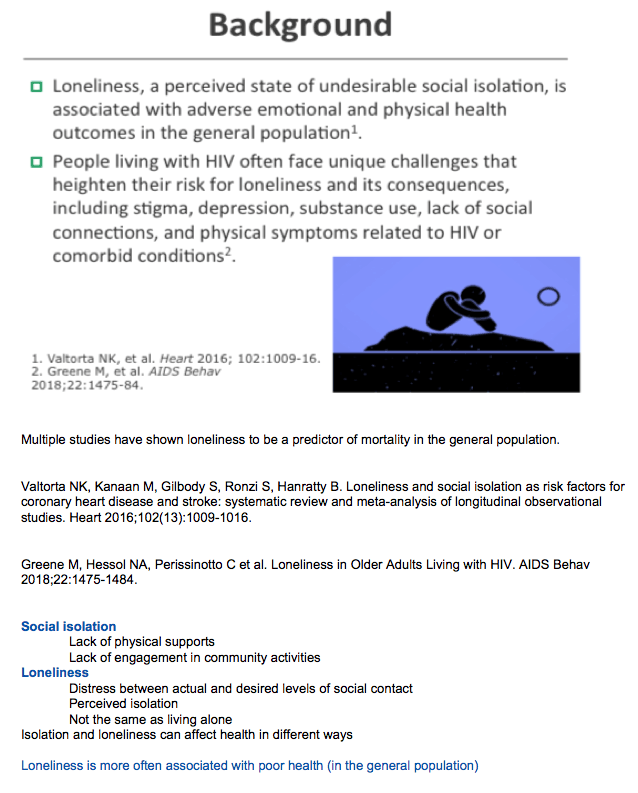
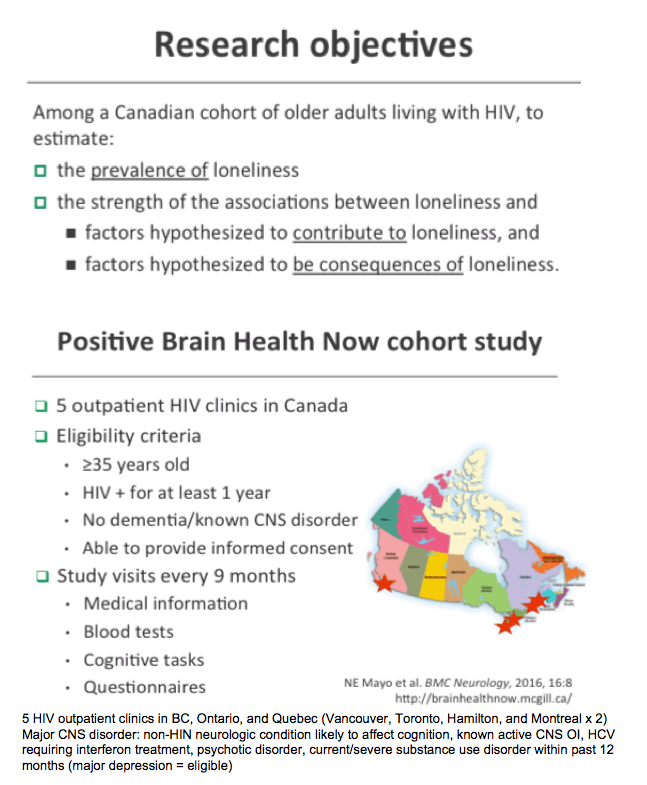
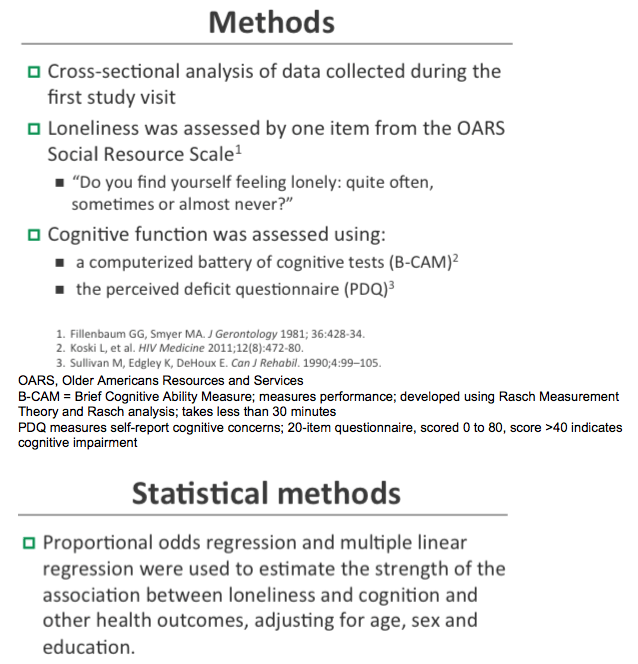
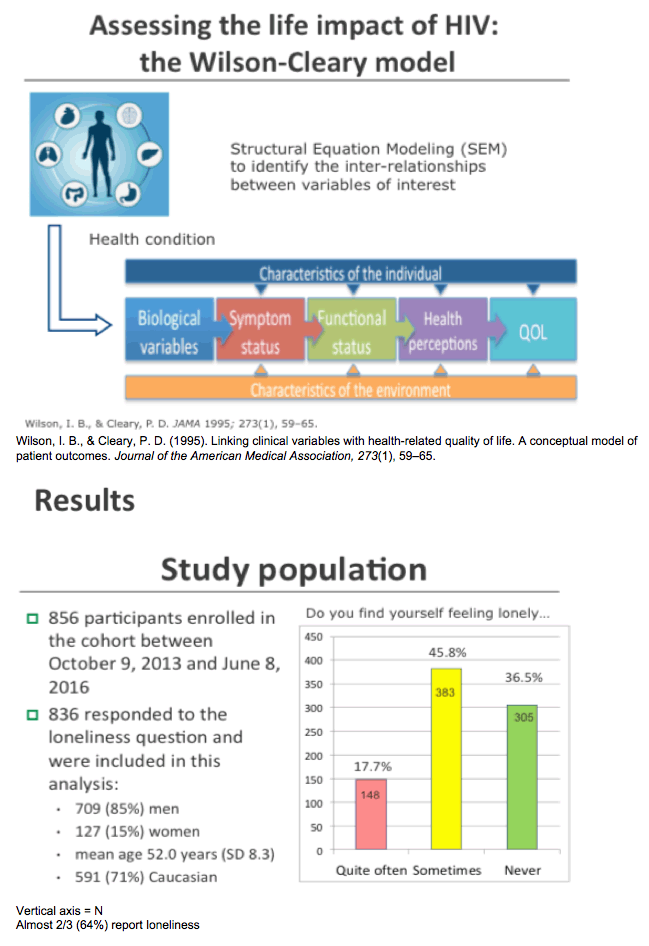
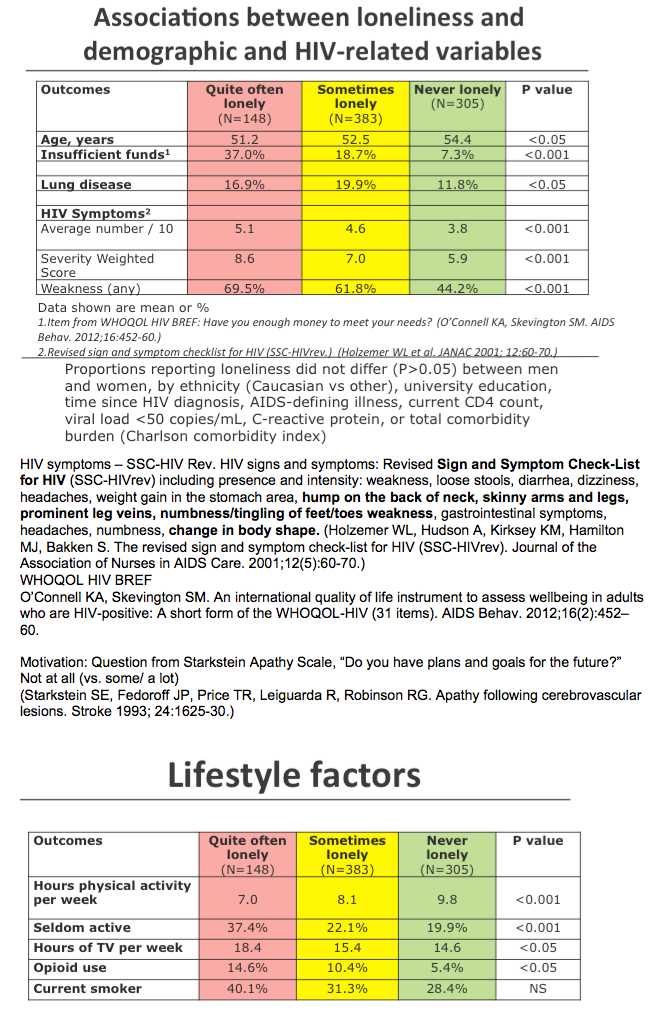
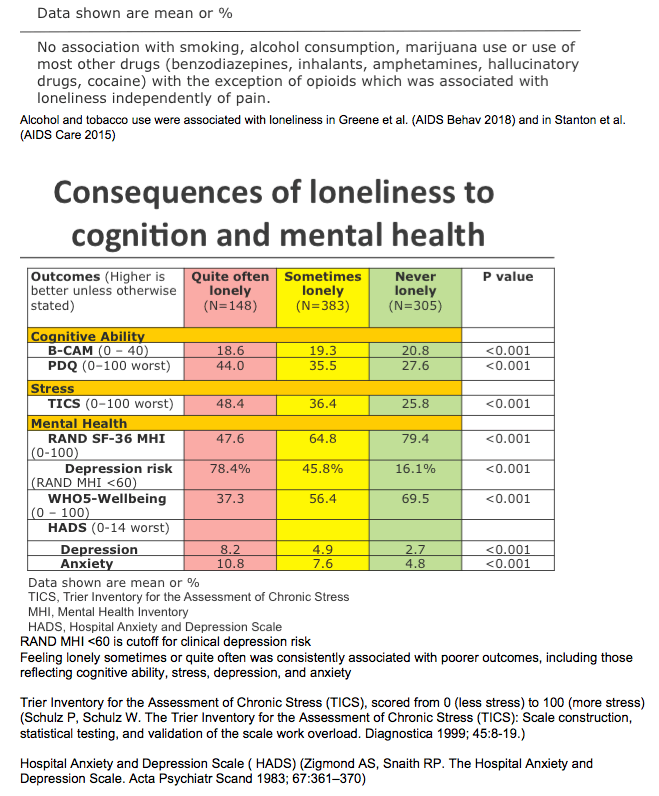
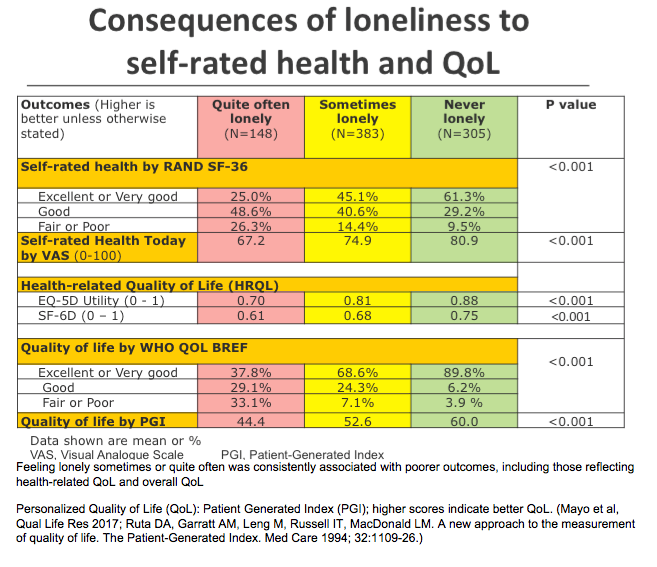
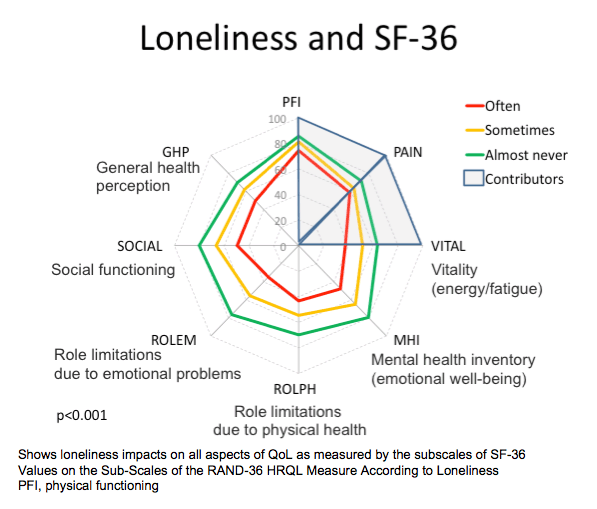
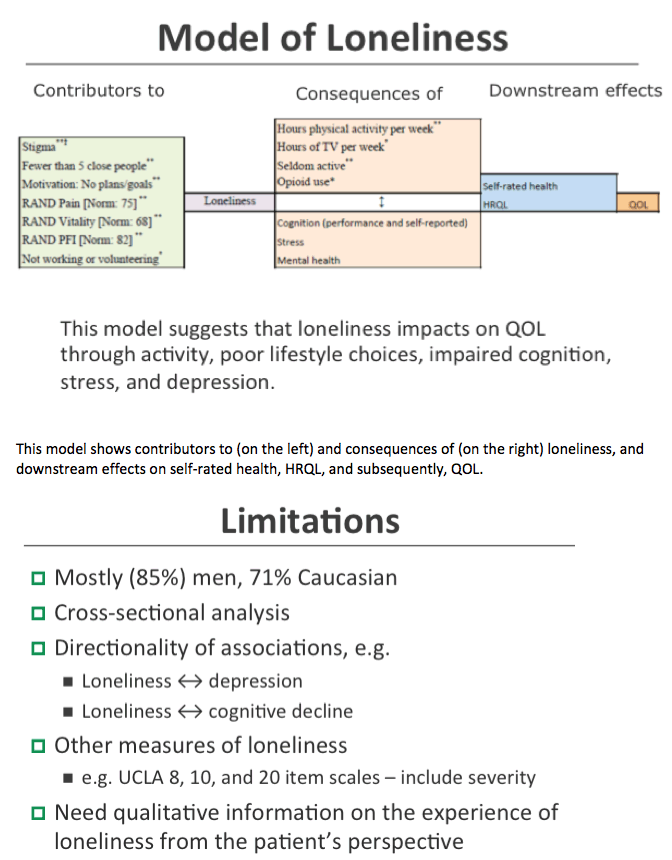
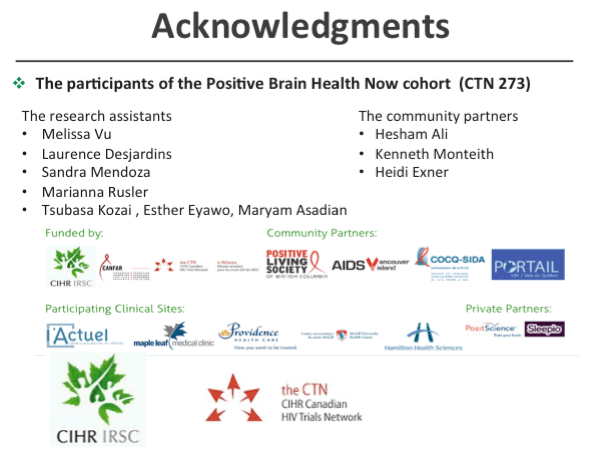
|
| |
|
 |
 |
|
|